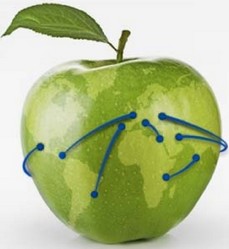 mall and medium firms do not normally have their own logistics structure and need to find ways to access their destination markets efficiently. To this end, certain services are needed that conventional refrigerated maritime operators cannot supply, as they do not cover the distribution at either origin or final destination," explains Rafael Llerena, of Easyfresh, an association of refrigerated logistics companies from all over the world based in Spain and in operations for 4 years.
mall and medium firms do not normally have their own logistics structure and need to find ways to access their destination markets efficiently. To this end, certain services are needed that conventional refrigerated maritime operators cannot supply, as they do not cover the distribution at either origin or final destination," explains Rafael Llerena, of Easyfresh, an association of refrigerated logistics companies from all over the world based in Spain and in operations for 4 years."We are not exclusively interested in maritime or land transport, which are just part of the cold chain. We pursue adding value from the harvest until the product is loaded on board, and from there on until it reaches its destination. We collaborate intensely with maritime lines, avoiding competition with them. Our competitors are each country's (and port's) local logistics firms, as there is no other global refrigerated operator specialised in the cold chain besides EasyFresh. In fact, we give value added to cold logistics from origin to destination, clearance in customs, transport and distribution, packing and labelling in warehouses and every other service products may need, to arrive earlier and better to the market. "We put ourselves in the position of our clients, we assess them and try having them buy or sell in the best conditions thanks to our specialised vision."
Trends in the demand of logistics services are changing compared to the traditional maritime lines. "We can now find new maritime routes which were not consolidated in the past, explains Rafael Llerena."Third countries which used to be small in terms of traffic are gaining importance, attracting numerous medium firms to establish their productions and/or sales networks. That is why it is important to stay up to date and for Easyfresh members to be always in contact with each other."
Its Global Conference is also organised annually. This year it will take place in Cologne, Germany, taking advantage of the "Anuga" fair. All sorts of commercial issues regarding international refrigerated traffic will be addressed, and even the development of specific projects, such as the refrigerated warehouse in Gdansk, Poland, next to DCT's Terminal.
Although EasyFresh has a worldwide commercial network in the main areas of production and consumption, it plans to expand and consolidate in Latin America and the Far East. "We are well-established in several South American countries, especially Brazil, but we wish to expand and improve our presence in other Latin American markets with still frequent logistic congestions.
Rafael Llerena also thinks that advances should be made in the application of work systems through fixed programs covering the entire chain. "We believe that the majority of countries need to start working with fixed programs, as they minimise risks and the costs derived, in a sector in which the nature of its goods depends on the weather and other variable factors.
Logically, this concept is more rooted amongst clients, but not so much at the place of origin, amongst producers and providers. We can help in conveying this culture, strongly promoted by supermarket chains, which need goods on their shelves of various origins and hemispheres all year round. A global logistics network perfectly adapts to this necessity, bringing together producers and clients and reducing costs."
Additionally, and analysing the challenges that refrigerated logistics must face, Rafael Llerena points out that the lines working with containers, which dominate the maritime part of the cold chain, prioritise dry cargo on their ships, laying cold cargo aside.
"Logically, for them the goal is to fill up the ship. Except for very exceptional shipments, cold cargo must adapt to this maritime phenomenon, which is not going to change. A global logistics operator can help exporters and clients in preventing these issues. It is all about presenting intelligent logistics solutions at the same level of service from any origin to any destination, improving the efficiency of the joint refrigerated service and understanding specific local factors, of both the goods and their markets.
Our clients, both exporters and importers, benefit from this vision. Our providers, especially maritime lines, see us as a necessary contributor, as we add logistics to the maritime component, which makes maritime routes viables, creates new business opportunities and helps improve the profitability of the already existing ones. We are permanently open to dialogue with maritime lines."





